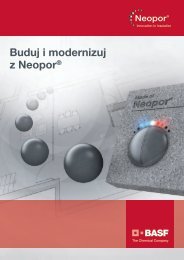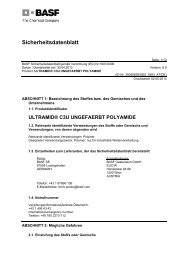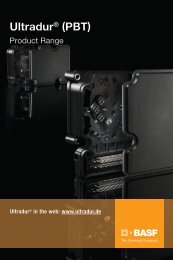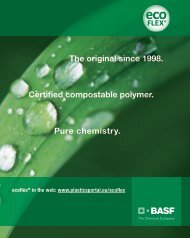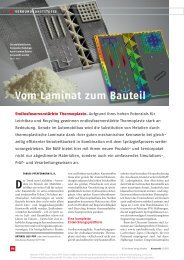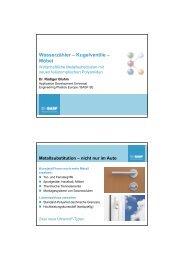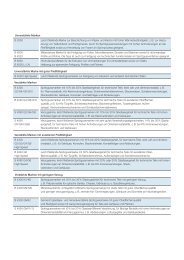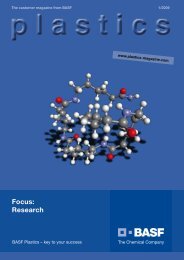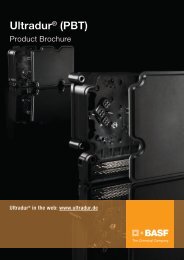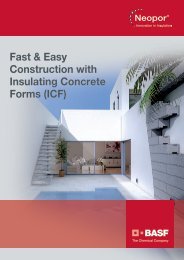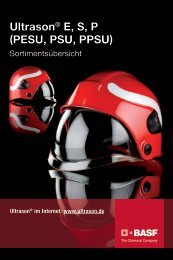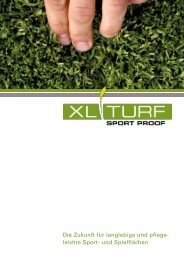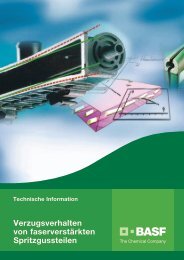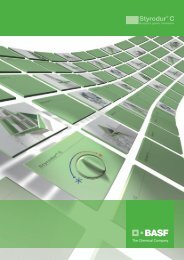plastics - The customer magazine from BASF 2/2007
plastics - The customer magazine from BASF 2/2007
plastics - The customer magazine from BASF 2/2007
Create successful ePaper yourself
Turn your PDF publications into a flip-book with our unique Google optimized e-Paper software.
Markets and products<br />
Endless sandy beaches and<br />
turquoise blue water before<br />
the backdrop of some of the<br />
most extravagant architecture in the<br />
world: the Abu Dhabi Emirate is visibly<br />
funneling its oil riches into futuristic<br />
projects. Right in the middle of<br />
the hot desert, the Isoplus company<br />
is laying new pipelines for the black<br />
gold and is padding the pipes with<br />
expansion cushions made of Neopolen<br />
® E (EPE) <strong>from</strong> <strong>BASF</strong>’s PlasticsPlus<br />
product line.<br />
Abu Dhabi 50 years ago: hardly a thing in<br />
sight except for a small hamlet where most<br />
of the locals lived in simple houses. <strong>The</strong>re<br />
was no trace of the luxury that we now associate<br />
with this metropolis. But luck was<br />
on the side of the island inhabitants and<br />
neighbors on Saadiyat Island (“Island of<br />
Happiness”) – in 1958, they struck oil. Since<br />
then, revenues have been gushing out of<br />
the ground and changes have occurred at a<br />
breakneck pace. Today, numerous futuristic<br />
high-rises, most of them with glass façades,<br />
dominate the skyline of the city of Abu<br />
Dhabi. Oil governs the fate of this country,<br />
so an efficient infrastructure to transport it<br />
is of paramount importance. This is where<br />
the Isoplus company comes in: this market<br />
leader in Germany in the realm of pipe<br />
systems is currently building a 234 kilometer-long<br />
pipeline. This company, whose<br />
<strong>customer</strong>s include large energy corporations<br />
like E.On as well as numerous municipal<br />
utility companies in Germany, has been<br />
developing and producing pipe systems for<br />
more than 30 years. Such systems serve to<br />
transport, among other things, hot liquids<br />
such as oil and water or even chemicals. <strong>The</strong><br />
heat inside the pipes causes the pipeline to<br />
expand, which calls for some leeway so that<br />
the pipes can shift. This is also the case in<br />
Abu Dhabi: the oil is heated up so as to flow<br />
through the pipelines faster – in its normal<br />
state, the oil would be too viscous and slow.<br />
<strong>The</strong> heat generated by the hot oil, however,<br />
causes the pipeline to expand and that is<br />
why foam cushions have to pad it. Isoplus<br />
manufactures such cushions with <strong>BASF</strong>’s<br />
Neopolen E panels. Contour cutting machines<br />
are employed to cut the panels into<br />
shaped sections that are then used in this<br />
function without any further treatment. However,<br />
in order to prevent heat accumulation<br />
in the crown of the pipes, they are not completely<br />
enclosed by the cushions. <strong>The</strong> panels<br />
are glued to the outer circumference only at<br />
the 3-o’clock and 9-o’clock positions. As is<br />
normally done with such partial jacketing, the<br />
lines – together with the expansion cushions<br />
– are wrapped with laminate. This prevents<br />
sand <strong>from</strong> penetrating between the lines and<br />
the cushions. Altogether, the project in Abu<br />
Dhabi required 21,381 meters of Neopolen E<br />
expansion cushions, which were transported<br />
in 30 shipping containers.<br />
Neopolen E and<br />
PUR in action<br />
Neopolen E panels consist of a closed-cell,<br />
physically cross-linked particle-foam made<br />
of polyethylene. Particularly in view of the<br />
physical cross-linking, this material has<br />
several properties that make it the material<br />
of choice for expansion cushions. For instance,<br />
Neopolen E has excellent resilience<br />
since this polyethylene foam deforms under<br />
load, giving the pipe with the necessary<br />
leeway to expand. When the load is eliminated,<br />
the material returns to its original<br />
state and can deform again the next time a<br />
load is exerted. Expansion cushions made<br />
of Neopolen E help to prevent damage to<br />
the pipelines. Neopolen E also stands out<br />
for having high temperature resistance,<br />
for being highly and permanently elastic<br />
as well as for being rot-proof. It does not<br />
pose a burden to the environment since it<br />
is rated in water-hazard class 0 and does<br />
not contain any water-soluble substances.<br />
It is free of chlorofluorocarbons, halogenated<br />
chlorofluorocarbons and compounds<br />
containing lead, cadmium, mercury or<br />
chromium. <strong>BASF</strong> is also to be found in<br />
oil pipelines, where the pipes are made<br />
of steel with a plastic jacket consisting of<br />
a layer of polyurethane (PUR) and a layer<br />
of poly-ethylene (PE) on top of it, hence<br />
the designation plastic-jacketed pipe. <strong>The</strong><br />
steel pipe itself serves to actually transport<br />
the oil. <strong>The</strong> special PUR foam Elastopor ®<br />
H made by <strong>BASF</strong> subsidiary Elastogran is<br />
applied as thermal insulation onto the steel<br />
for many pipes made by Isoplus. Thanks to<br />
its outstanding insulating properties, it holds<br />
the heat inside the pipe and keeps the oil<br />
flowing smoothly. For exterior protection,<br />
the PUR foam is wrapped in a PE sheathing<br />
that not only absorbs mechanical stresses<br />
but also provides protection against the elements<br />
while the pipeline is being laid.<br />
Further information:<br />
www.neopolen.de<br />
www.elastogran.com<br />
www.isoplus.de<br />
Background<br />
Neopolen ® E<br />
Material:<br />
EPE - foam consisting of cross-linked<br />
polyethylene<br />
Application examples:<br />
packaging, expansion cushions<br />
Properties:<br />
high resilience, high energy absorption,<br />
flexibility, chemical resistance<br />
Laying oil pipelines using expansion cushions made of Neopolen E.<br />
33



